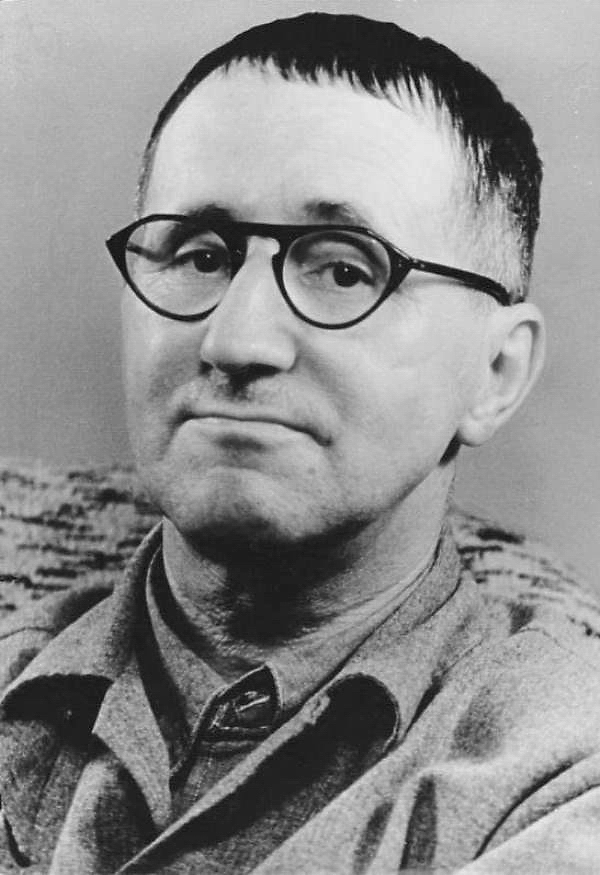Theatre Practitioners: Bertolt Brecht

Eugen Berthold Friedrich
Born: February 10, 1898, Augsburg, Germany, middle-class family
Died: August 14, 1956, Mitte, Berlin, Germany
Influenced by: Karl Marx (Marxism)
Served medical orderly in the First World War but was appalled by the effect of war and so he went to Munich and Berlin to pursue a career in theatre. The pattern of unsuccessfulness repeated all his life; quarreled with actors and other directors were forced to take over. Life came to an end when the Nazi's came into power in 1933 and had Brecht fled by removing his citizenship. However, many movies, books and playwrights were produced during these years.
Important plays were Drums in the Night, which had the theme of soldiers returning from war and Baal, with a strongly anti-bourgeois theme. One of the finest anti-war plays was called Fear and Misery of the Third Reich. Since Brecht was against cathartic theatre, his techniques were to remind the audience that they are watching a theatre piece and not real life. He called this this the "Epic Theatre" which distanced the audience from emotional involvement throughout the play.
Verfremdungseffekt:
- Better known as the alienation effect (shortened to the "v" affect)
- Was so the characters avoided emotional investment from the audience
- Approach to theatre has political, social or a moral message
- Parable
- Breaks the fourth wall
- Audience = active members of the theatrical experience
Baal:
- Anti-play
- Theme of negative qualities of naturalistic writing
- Sentimentalized conclusion
- Heavily influenced by Buchner's "Woyzeck"
- Episodic structure (Epic Theatre)
- Subtitled scenes
- Novel & radical idea
- Composed short scenes which could move around in time and place without any apparent continuity
- Return of soldiers from war (1922)
- Protagonist placed in the centre of his post-war world
- Exploring the man's destiny in a hostile and revolutionary social environment
- De-romanticize the act of watching
- Leading to distanced objectivity
- Demonstrating dislike for any kind of illusion in the staging
- Awarded the prestigious Kleist prize and immediately became a sought-after playwright
In The Jungle of Cities:
- Placed in imaginary Chicago
- Inspired by Upton Sinclair's novel "The Jungle"
- Repeated this setting for various other plays
- Tangible reality as a method of staging
- Established aspects of form and content quickly
Epic Theatre:
- Structure were in his first plays
- Arrangement of scene and their titles led to montage
- Key theme was man within his social environment
- Theatrically of high complexity
- Firmly established in the last 10 years (1940's and 1950's)
- An almost bare stage with the audience standing around it
- Political and personal events unfolding in swiftly changing scenes
- Gripping stories of kings and their lives presented for a semi-literate audience
- Performance that has taken place in daylight
Dramatic Theatre
|
Epic Theatre
|
Plot has beginning, middle and end
|
Narrative begins anywhere, continues and stops (events jump)
|
Implicates the spectator in a stage situation (real life)
|
Turns the spectator into an observer, the spectator can
question what they’re seeing
|
Communicates experience
|
Communicates insights
|
Provides the audience with sensations
|
Forces the audience to make decisions
|
Brings event to life
|
Relates the event
|
Suggestive
|
Argumentative
|
Instinctive feelings are preserved
|
Brought to the point of recognition
|
The spectator is in the thick of it and shares the
experience
|
The spectator stands outside and studies
|
The human being is taken for granted
|
The human being is the object of the enquiry
|
The human being is unalterable
|
The human being is alterable
|
Once scene makes another (linear development)
|
Each scene for itself
|
Growth follows the plot triangle
|
Montage and events are shown in self-contained scenes
|
Eyes on the finish line
|
Eyes on the course
|
A human being as a fixed point
|
Human being as a process
|
Thought determines being
|
Social being determines thought
|
Audience can indulge in emotion
|
Audience is removed from emotional attachments and is made
to question with reason
|
Naturalism:
- Anti-naturalism presentation was an objective
- By placing the action into imagined worlds, the audience could be distanced from the human conflicts
- Seemingly unrelated images could take new meaning by the way in which a film editor cut them together
- Contract or extend real time by manipulating images
- Short self-contained scenes could be juxtaposed with each other, creating "shocks"
- Emphasis was on the visual
- Readable by a deaf person
- Not a single person who could not understand what was happening
- Breaking down of action into minute details
- A way in which continuity could be broken and fractured
- Audience was to be kept in a constant state of alertness
This information gives you a good basis for further research into this practitioner if you decide to look at his contribution to theatre in more depth for your solo project. As a theatre student you ought to undertake some independent research into Brecht anyway because you will find some of his ideas are still revolutionary and you may wish to use them in your devised work.
ReplyDelete